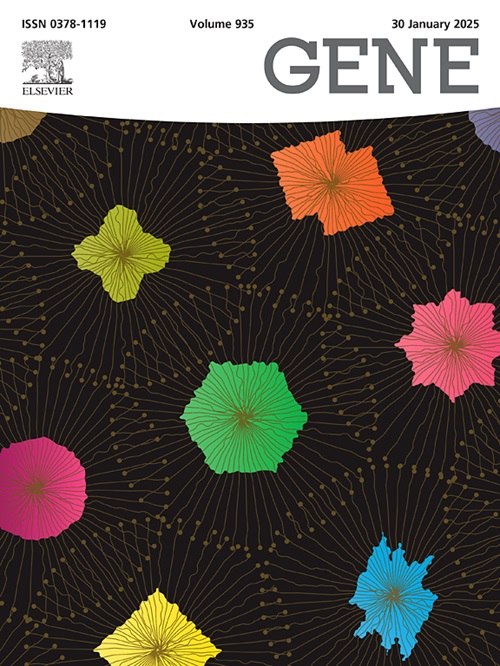FGF-2 基因与荷斯坦-弗里斯兰奶牛的生产性能之间存在密切联系。
IF 2.6
3区 生物学
Q2 GENETICS & HEREDITY
引用次数: 0
摘要
奶牛场的可持续性取决于产奶量和繁殖性状的效率。因此,本研究旨在调查 FGF-2/Csp6I 基因和主要环境因素对荷斯坦-弗里斯兰牛这些性状的影响。研究人员从牛的尾静脉采集了 212 份全血样本,并将从这些样本中获得的数据用于所有统计分析。然后,采用限制性片段长度多态性(RFLP)方法(确定基因型),并使用 PopGene(等位基因和基因型频率)、Minitab(关联分析)和 MTDFREML(方差成分和遗传参数)等程序。结果发现,等位基因 A (0.4269) 和 G (0.5731) 以及基因型 AA (0.174)、AG (0.505) 和 GG (0.321),表明该群体具有多态性,且处于哈代-温伯格平衡状态(P > 0.05)。FGF-2 基因 Csp6I 多态性对高峰产奶量(PMY)(P 305 和 LMY200)、平均日产奶量(ADMY)(P 100)、首次配种使用年龄(AUFB)和每次受精次数(NIPC)的影响(P本文章由计算机程序翻译,如有差异,请以英文原文为准。

Strong associations between the FGF-2 gene and productivity traits of Holstein-Friesian dairy cattle
Sustainability in dairy cattle farms depends on the efficiency of milk yield and reproductive traits. Thus, this study aimed to investigate the effect of the FGF-2/Csp6I gene and major environmental factors on these traits in Holstein-Friesian cattle. A total of 212 whole blood samples were collected from the Vena coccygea of cattle and the data obtained from these samples were used in all statistical analyses. Then, the restriction fragment length polymorphism (RFLP) method (determination of genotypes) was conducted and programs including PopGene (allele and genotype frequencies), Minitab (association analyses) and MTDFREML (variance components and genetic parameters) were used. Alleles A (0.4269) and G (0.5731) as well as genotypes AA (0.174), AG (0.505) and GG (0.321) were found, indicating that the population is polymorphic and in Hardy-Weinberg equilibrium (P > 0.05). The effect of the Csp6I polymorphism of FGF-2 gene on peak milk yield (PMY) (P < 0.01); lactation milk yield (LMY), milking time (MT), 305-day and 200-day lactation milk yield (LMY305 and LMY200), average daily milk yield (ADMY) (P < 0.05); 100-day lactation milk yield (LMY100), age of using in first breeding (AUFB) and number of inseminations per conception (NIPC) (P < 0.10) were significant. The heritability of milk yield traits and the correlation between direct and maternal heritability for reproductive traits were high. Furthermore, the breeding value of PMY was higher for the AA genotype (0.745 ± 0.292) than for the AG genotype (−0.268 ± 0.171) (P < 0.05). As a result, the A allele and AA genotype for the FGF-2/Csp6I gene had an increasing effect on milk yield without compromising reproductive performance in Holstein-Friesian dairy cattle.
求助全文
通过发布文献求助,成功后即可免费获取论文全文。
去求助
来源期刊

Gene
生物-遗传学
CiteScore
6.10
自引率
2.90%
发文量
718
审稿时长
42 days
期刊介绍:
Gene publishes papers that focus on the regulation, expression, function and evolution of genes in all biological contexts, including all prokaryotic and eukaryotic organisms, as well as viruses.
 求助内容:
求助内容: 应助结果提醒方式:
应助结果提醒方式:


